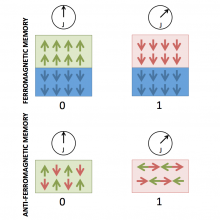Prof Andrew Ferguson and Dr Chiara Ciccarelli (Microelectronics)
Until now, commercial magnetic memory designs have relied exclusively on ferromagnetic units, with the bits “0” and “1” being encoded in their magnetisation orientation (see top figure). Ferromagnets, however, possess an innate limitation in terms of down-scaling and operating speed. The pressing task of improving performances has led to a growing interest in alternative materials, such as anti-ferromagnets.
Anti-ferromagnets are magnetic materials that contain within them oppositely aligned and inseparable magnetic moments, resulting in an overall zero magnetisation. This characteristic makes them more stable against miniaturisation. Moreover, the switching of the magnetic moments is 1000 times faster, potentially making data recording 1000 faster.
Having zero net magnetisation, anti-ferromganets are unresponsive to magnetic fields and we must rely on electricity to both read and write the magnetic order within them. In this project we will investigate how efficiently electrical currents perturb the anti-ferromagnetic ordering and can therefore be used to switch between different states of an anti-ferromagnetic memory cell (see bottom figure). We will also study different layouts to convert anti-ferromagnetic dynamics into an easily accessible electrical signal.


